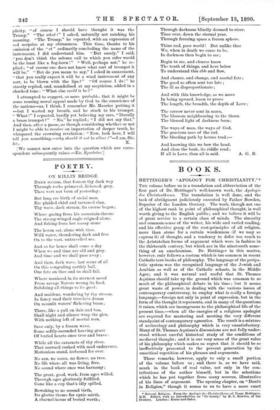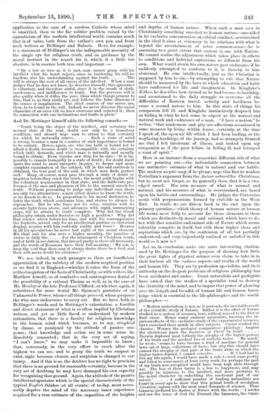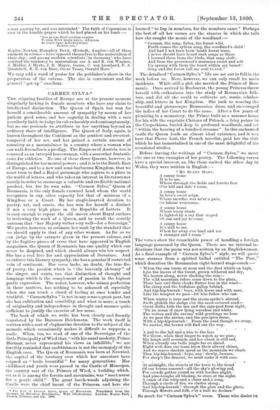BOOKS.
HETTINGER'S "APOLOGY FOR CHRISTIANITY." THE volume before us is a translation and abbreviation of the first part of Dr. Hettinger's well-known work, the Apologie des Christenthums. The translation is well done, and the task of abridgment judiciously executed by Father Bowden, Superior of the London Oratory. The work, though not one of the highest rank in point of philosophical thought, is well worth giving to the English public; and we believe it will be of great service to a certain class of minds. The sincerity and common-sense of the writer, his wide and varied reading, and his effective grasp of the root-principles of all religion, more than atone for a certain woodenness (if we may so express it) of thought, and a tendency to defer too much to. the Aristotelian forms of argument which were in fashion in the thirteenth century, but which are in the nineteenth some- thing of an anachronism. Dr. Hettinger in this matter, however, only follows a custom which is too common in recent Catholic text-books of philosophy. The language of the peripa- tetic system was the recognised language of the Jewish and Arabian as well as of the Catholic schools, in the Middle- Ages; and it was natural and useful that St. Thomas Aquinas should take up the ground which was common to so much of the philosophical debate in his time ; but it seems great waste of power, in dealing with the various issues of contemporary controversy, to employ what is really a foreign language,—foreign not only in point of expression, but in the form of the thought it represents, and in many of the questions it raises, which are incongruous to the philosophical life of the present time,—when all the energies of a religious apologist are required for mastering and meeting the very different standpoint of contemporary agnostics. The result is a mixture of archaeology and philosophy which is very unsatisfactory. Many of St. Thomas Aquinas's discussions are not fully under- stood without careful historical study of the conditions of mediaeval thought ; and it is our very sense of the great value of his philosophy which makes us regret that it should be so • ineffectively presented to the present generation by the uncritical repetition of his phrases and arguments.
These remarks, however, apply to only a small portion of the volume before us ; and there is, as we have said, much in the book of real value, not only in the con- tributions of the author himself, but in the selections which he has put together from many sources, illustrative of his lines of argument. The opening chapter, on "Doubt in Religion," though it seems to us to have a more exact
• Natural Religion. From the Apologie des Christenthums of Franz Hettinger, D.D. Edited, with an Introduction on " Certainty," by H. S. Bowden, of the Oratory. London : Burns and Oates.
application to the case of a careless Catholic whose mind is unsettled, than to the far subtler problem raised by the agnosticism of the modern intellectual world, contains much that is of value, both from the author's own pen, and from such writers as DoRinger and Balmes. Here, for example, is a statement of D011inger's on the indispensable necessity of the single eye for religious truth, and on guidance by the moral instinct in the search for it, which, if a little too absolute, is in essence both true and important :-
" By a law as wise as it is just, man cannot grasp with his intellect what his heart rejects, since in hardening his will he
hardens also his understanding against the truth The will is always the root of all errors of the intellect. When a man judges that he does not know, he deceives himself ; this ignorance is voluntary, and therefore sinful, since it is the result of sloth, carelessness, and indifference to truth. But the perverse will is also guilty when it stifles the pure ideas which things present to him, that is, as they really are, and follows the false illusions of the senses or imagination. The chief sources of our errors are, then, to be found in the will. Indeed, we never discover the moral character of an error till we have overcome and rejected it ; then its connection with our inclinations and faults is plain."
And Dr. Hettinger himself adds the following remarks :- "Truth being the object of the intellect, and certainty the normal state of the soul, doubt can only be a transitory condition, and should urge man to attain to that certainty for which he naturally craves Such a state of mind is wrong, because a man in a matter of such importance is bound to be certain. Hence, again, one who has faith is bound not to admit a doubt, because doubt is incompatible with the certainty which faith demands, and which man is naturally and morally bound to obtain. Even Goethe saw this, for he says : It is im- possible to remain tranquilly in a state of doubt ; for doubt itself spurs the mind to more energetic inquiry, to deeper and more complete examination of the subject, till in the end certitude is obtained, the true goal of the soul, in which man finds perfect rest.' Many, of course, must pass through a state of doubt or negation before they reach the truth ; the moral guilt begins with the voluntary acquiescence in that state, and the deliberate pre- ference of the ease and pleasures of life to the earnest search for truth. Without presuming to judge any individual case, there are only two alternatives : a man either desires to know the truth, or he dreads to do so. In proportion to his moral declension, he hates the truth which condemns him, and strives to silence its reproaches. But he who fears not its voice, receives with its accents light from above, and advances with rapid, unwearying steps, till he attains to truth complete. Why did the Greek philosophy attain under Socrates so high a position ? Why did that science which before his time, and with his contemporaries the Sophists, served only for an intellectual pastime or rhetorical display, acquire with him suddenly reality and force ? Because in all his speculations he never lost sight of the moral element. His ideal and his aim were a higher morality, the practice of
virtue in daily life For the attainment of Christian truth, and of faith in revelation, this inward purity is above all necessary, and the words of Rousseau have their full meaning : My son, so keep thy soul that thou may'st always desire there be a God, and thou wilt never doubt his existence.' "
We see, indeed, in such passages as these an insufficient appreciation of the subtlety of the modern sceptical position as we find it in England,—whether it takes the form of the critical negation of the facts of Christianity, as with writers like Matthew Arnold; or of combative and contemptuous denial of the possibility of a rational Theism as well, as in the case of Mr. Huxley or the late Professor Clifford ; or whether, again, it substitutes for mere denial Mr. Spencer's postulate of an Unknowable Power, whence all things proceed, whose purposes the wise man endeavours to carry out. But we have, both in Dbllinger's words and in Hettinger's exhortation, a forcible and direct statement of what is so often implied by Christian writers, and yet so little faced or understood by modern rationalists, that there is a faculty for religious knowledge in the human mind which becomes, so to say, atrophied by disuse, or paralysed by the attitude of passive sus- pense; that knowledge and action are in some sense in- dissolubly connected ; that in the very act of saying, "I can't know," we may make it impossible to know ; that, conversely, in the very effort to reach after the highest we can see, and to grasp the truth we suspect to exist, sight becomes clearer, and suspicion is changed to cer- tainty.. And if this is so, the doubter has no right to proclaim that there is no ground for reasonable certainty, because in the very act of doubting he may have damaged his own capacity for recognising that ground. Again, the attitude of the passive intellectual spectator which is the special characteristic of the typical English thinker (at all events) of to-day, must neces- sarily deprive the mind of the necessary inner experience required for a true estimate of the capacities, of the heights and depths, of human nature. When such a man sees in Christianity something unsuited to human nature—one-sided in its exclusive concentration on ethical conduct, overstrained in the ideal it aims at, visionary in its relations with what is beyond the ascertainment of sober common-sense—he is assuming to a great extent that custom is one with Nature He cannot realise the adjustment which takes place in others- to conditions and habitual aspirations so different from his own. What would strain his own nature past endurance if he suddenly attempted to conform to it, is thereby to him abnormal. He sins intellectually, just as the Christian is supposed by him to sin,—by attempting to rule that Nature should be measured by the laws to which education and habit have conformed his life and imagination. In Kinglake's. Eiithen, he describes how, inured as he had become to hardship,. and accustomed to the daily struggle to overcome all the difficulties of Eastern travel, activity and hardiness be- came a second nature to him. In this state of things his companion fell ill, and Kinglake instinctively despised him as failing in what he had come to expect as the normal and natural work and endurance of a man. " I have a notion," he writes, "that tenderness and pity are affections occasioned in some measure by living within doors ; certainly, at the time I speak of, the open-air life which I had been leading, or the wayfaring hardships of the journey, had so strangely blunted me that I felt intolerant of illness, and looked upon my companion as if the poor fellow, in falling ill, had betrayed a want of spirit."
Here is an instance from a somewhat different side of what we are pointing out,—the indissoluble connection between our instinctive estimate of what is natural and our habits. The modern sceptic may, if he please, urge this fact to weaken Tertullian's argument from the Anima naturaliter Christiana, but he must not forget, as he generally does, that it is a two- edged sword. His own measure of what is normal and natural, and his measure of what is overstrained, are based upon his habits and surroundings. He judges the Cistercian monk with prepossessions formed by club-life in the West End. In truth, we are driven back in the end upon the primary question,—which theory of human nature or human- life seems most fully to account for those elements in them which are distinctively moral and rational, which have to do, not with that sensitive and animal side of Nature which seems tolerably complete in itself, but with those higher ideas and aspirations which are, by the confession of all, but partially understood, and very imperfectly realised or satisfied in this world as it now is ?
Let us, in conclusion, make one more interesting citation, used by Dr. Hettinger for the purpose of showing how little the great lights of physical science even claim to take in in their horizon all the various aspects and truths of the world and human life. They are by profession specialists, and their authority on the deepest problems of religious philosophy has been accidental and undue. Great naturalists and geologists have owned that the studies of a specialist tend to destroy the elasticity of the mind, and to impair that power of glancing over the length and breadth of human life and human know.
ledge which is essential to the life-philosopher and the world
philosopher world- philosopher:— "Modern materialism is not, as it pretends, the inevitable result of the scientific study of Nature. Rather it is the effect of Nature studied as a system of necessary laws, without regard to the first or final cause. Hence many eminent naturalists, knowing the in effects of the exclusive study of the experimental sciences, have exercised their minds in other subjects. Cuvier studied the classics ; Werner the geologist comparative philology ; Ampere the electrician knew the Imitation of Christ by heart Darwin deplored most bitterly the atrophy of the higher powers of his brain and the gradual loss of ,esthetic tastes. My mind,' he wrote, seems to have become a kind of machine for general laws out of large collections of facts ; but why this should have caused the atrophy of that part of the brain alone on which the higher tastes depend, I cannot conceive If I had had to• live my life again, I would have made a rule to read some poetry and listen to some music at least every week, for perhaps the part of my brain now atrophied would have been kept alive through use. The loss of these tastes is a loss to happiness, and may possibly be injurious to the intellect, and more probably to the moral character by enfeebling the emotional part of our nature.' A sufficient number of leading naturalists are found in every age to show that this primal truth of revelation [Creation] agrees with the most exact demands of science. Thus Linntens prefaced his System of Nature with the words : I awoke and saw the trace of God the Eternal, the Immense, the Omni-
scient passing by, and was astounded.' The faith of Copernicus is seen in the humble prayer which he had placed on his tomb :-
Non parem Pauli gratiam requiro Wiliam Petri neque posco ; sed quam In crucis lignn dedera.9 latroni Beduins oro.'
Kepler, Newton, Humphry Davy, (Erstedt, Ampere—all of them eminent in science —have opposed themselves to the materialism of their day ; and among modern scientists [in Germany] who have resisted the tendency to materialism are A. and R. von Wagner, J. Madler, J. Hyrte, J. R. Mayer, Gauss, C. von Leonhard, F. A. Quenstedt, K. E. von Baer, Oscar Traas, Oswald Heer."
We may add a word of praise for the publisher's share in the preparation of the volume. The size is convenient and the general " get-up " excellent.








































 Previous page
Previous page